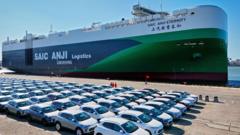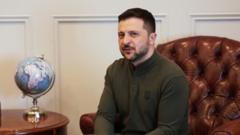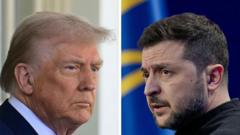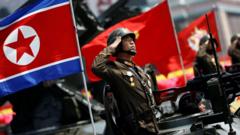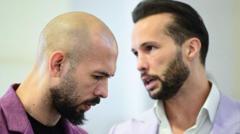With a tight race unfolding for the leadership of Canada’s Liberal Party, candidates highlighted their views on national and international challenges, notably addressing responses to US President Donald Trump's policies, Canada's economic issues, and the future of military spending and climate action debates.
Key Insights from Canada’s Liberal Leadership Debates
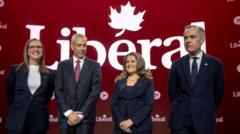
Key Insights from Canada’s Liberal Leadership Debates
Liberal party candidates face off as they tackle pivotal issues ahead of the upcoming election.
The candidates vying to succeed Prime Minister Justin Trudeau as leader of Canada’s Liberal Party have engaged in two intense debates in both English and French, making their cases to voters. The contenders include former governor of the Bank of Canada and England, Mark Carney, former finance minister Chrystia Freeland, House government leader Karina Gould, and businessman Frank Baylis. With the leadership vote set for March 9, the winner will lead the Liberals into the next general election, required by October 20 at the latest.
A significant topic during the debates has centered on Canada’s strategy in light of US President Donald Trump's provocative statements and policies. Many candidates voiced that Trump's proposed tariffs and hints at annexing Canada raise serious concerns for the nation's sovereignty. Freeland, drawing on her negotiation experience, positioned herself as a seasoned candidate capable of tackling Trump's aggressions. Carney warned that Trump's current stance is less opportunistic and more confrontational, suggesting that Canada must prepare for a new kind of engagement. Gould emphasized the importance of diversifying Canada's economic connections beyond the US, while Baylis advocated strengthening ties with the UK, New Zealand, and Australia.
Economic concerns weigh heavily on the minds of Canadians, especially given the recent contraction of the economy and rising living costs. Carney’s proposals included a budget-balancing plan within three years alongside support for Liberal priorities like childcare. Freeland asserted that Canada's finances remain robust and should harness national pride for job creation. Gould argued for transparency with voters regarding budgetary realities, advocating for a focus on modernizing social safety nets instead.
The candidates did not shy away from attacking Conservative leader Pierre Poilievre, who is shown as a rival in polling. Their critiques were inspired by his recent approach, which they feel mirrors Trump’s populism at home. Polled support hints at a tightening race for leadership following Trudeau's resignation, as the Liberals seek to regain momentum.
In the realm of international policies, all candidates demonstrated a commitment to backing Ukraine amid ongoing conflict with Russia, endorsing Canada’s commitment to NATO spending, albeit with variations in suggested timelines. Freeland urged investing in advanced military capabilities by 2027, whereas others proposed a 2030 timeframe.
On climate policy, a contentious carbon tax has led to divergent opinions among the candidates. While Carney and Freeland recognized the tax's unpopularity and pledged to pivot away from it, Gould and Baylis maintained that it remains essential in combating climate change, stressing that environmental strategies come with fiscal implications.
As the leadership race heats up, the issues addressed in these debates are likely to shape the future of the Liberal Party and Canada's political landscape in the months to come.


